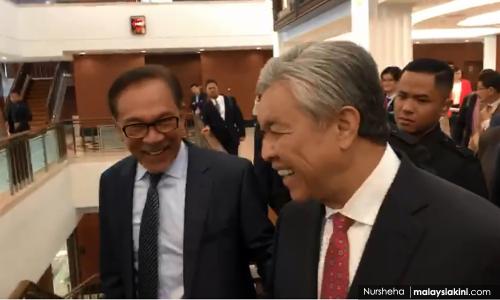LETTER | Should Zahid be included in Anwar's cabinet?
LETTER | The post-GE15 government was finally formed after Pakatan Harapan chairperson Anwar Ibrahim was appointed the 10th prime minister of Malaysia by the Yang di-Pertuan Agong with the support of BN (BN), Gabungan Parti Sarawak (GPS), Gabungan Rakyat Sabah (GRS), and other smaller parties and independents.
It is a challenging situation for Anwar, especially when it comes to cabinet appointments. As much as he claims that granting ministerial positions is not a form of reward for support, Anwar could not escape the fact the politics is about the struggle for power and benefits, and that his administration is formed by fragile and segmented components.
If the matter of cabinet appointments is not carefully dealt with, his government won’t last long.
This brings us to Umno president Ahmad Zahid Hamidi. He was the key figure that ended the political impasse after GE15 by leading BN and its 30 MPs to support Anwar as the prime minister.
Based on the notion explained above, it seems necessary for Anwar to grant him a ministerial position.
However, in my view, granting Zahid a ministerial position as a form of goodwill to strengthen Umno’s support is unsustainable, from both the public and Anwar’s personal perspectives.
From the public’s perspective, Zahid still has 47 ongoing corruption charges being tried in court. Since Bersatu president Muhyiddin Yassin became the prime minister in 2020, it has been a practice in Malaysia for prime ministers to reject those with court cases from joining the cabinet.
Appointing Zahid into the cabinet now risks Anwar’s public image, especially when he shouted anti-corruption slogans so loudly during the GE15 campaign.
From Anwar’s personal perspective, Zahid is now very unpopular in Umno. I speculate that his reputation as Umno president will further decline after he claimed that the bold “No Anwar, no DAP” that he took during Umno’s general assembly last year was only applicable to pre-election collaboration.
The grassroots within Umno are showing strong dissatisfaction towards him, with many calling for him to step down for leadership reforms.
Therefore, judging from the present scenario, it is highly likely that Zahid will lose the upcoming Umno elections, which are set by its constitution to be conducted six months after a general election at the latest.
However, I acknowledge that many things can happen in six months to potentially rescue Zahid’s image, rendering it meaningless to speculate what may happen in the future.
If Zahid loses the upcoming Umno party elections, then no one will be there to bridge Anwar’s control on Umno for stability. The government might still collapse, especially if former prime minister Ismail Sabri Yaakob or anyone from his faction emerges to hold Umno’s top positions. They might pull support from Anwar as they have openly declared their stance against Harapan since GE15 was concluded.
In my opinion, if Anwar wants long-term stability, including Ismail Sabri and his faction in the cabinet while feeding Zahid with sufficient benefits seems to be the way.
With 40 years of experience in politics, Anwar should have the wisdom on how to balance between the two Umno factions to safely keep the government in power for the next six months. Any drastic changes can be done after Umno’s internal elections.
The views expressed here are those of the author/contributor and do not necessarily represent the views of Malaysiakini.
RM12.50 / month
- Unlimited access to award-winning journalism
- Comment and share your opinions on all our articles
- Gift interesting stories to your friends
- Tax deductable
